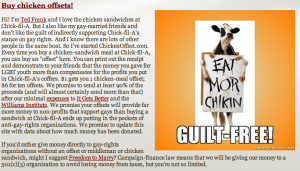The Birth of the “Chicken Offset”
The battle over gay rights and the Southern fast food chain Chick-fil-A has dominated the news in the last couple of weeks.
Kiss-ins, boycotts, and counterprotests have all ensued. But maybe the most clever response to the anti-gay marriage comments is the “chicken offset,” the brainchild of a lawyer, political operative, and all-around character named Ted Frank (disclosure: one of us – Sprigman – went to law school with Ted).
These build on the existing idea of “carbon offsets,” which started out as a way to bring market flexibility to CO2 emissions caps. If a polluter exceeds a cap, it can purchase an offset. The money that the polluter pays for the offsets supports projects that reduce CO2 emissions – say, the construction of a wind farm. The new, green projects “offset” the bad emissions.
Today, firms like Brighter Planet offer offsets that consumers can voluntarily purchase to balance out the carbon output of their flying, their houses, their weddings, and even their pets (did you know that the average housecat has a carbon pawprint of over 0.5 ton – mostly from production and transport of cat food?).
 Ted’s stroke of inspiration was to tweak the concept of the offset and apply it to chicken sandwiches. As he explains on his new website, chickenoffsets.com, he loves Chick-fil-A sandwiches, but doesn’t want his love to come at the expense of his gay friends. And so every time you give in to that chicken sandwich jones, Ted will sell you an offset for $1. He promises that he’ll give at least 90% of that dollar to pro-gay rights groups. Which is much more than anti-gay groups are going to make on your lunch at Chick-fil-A. And you get a certificate to prove to anyone who spies you at a Chick-fil-A that you’ve already taken steps to undo any damage.
Ted’s stroke of inspiration was to tweak the concept of the offset and apply it to chicken sandwiches. As he explains on his new website, chickenoffsets.com, he loves Chick-fil-A sandwiches, but doesn’t want his love to come at the expense of his gay friends. And so every time you give in to that chicken sandwich jones, Ted will sell you an offset for $1. He promises that he’ll give at least 90% of that dollar to pro-gay rights groups. Which is much more than anti-gay groups are going to make on your lunch at Chick-fil-A. And you get a certificate to prove to anyone who spies you at a Chick-fil-A that you’ve already taken steps to undo any damage.
The chicken offset is a great and funny idea. And, quickly, another Chick-fil-A offset competitor has appeared. Ted’s site went live last Saturday. By Monday morning, chickfilaconfessional.com was up. Chickfilaconfessional adds a few neat twists to Ted’s concept. You tell the website exactly what you had to eat at Chick-fil-A. Based on your input, it calculates an appropriate penance and directs you to pro-gay rights organizations who will be happy to accept your donation.
When we asked Ted if he was annoyed by his new competitor, he waved off the question. He’s not even sure they copied him – the idea, he said, was “in the air.” Soon after the Chick-fil-A controversy broke, he remembers someone making a joke about “chicken offsets” on Twitter.
We don’t know for sure whether chickfilaconfessional.com copied chickenoffsets.com. It may be that both arrived at the same idea independently, or perhaps that both were inspired by the same Twitter joke. But like a lot of new products and services, the chicken offset competition shows how essential tweaking is to the innovative process.
The chicken offset tweaks the personal carbon offset. The personal carbon offset, in turn, tweaks the offset systems built into climate change regulations like those operating now in Europe. And the EU’s offset program tweaks the Environmental Protection Agency’s pioneering “cap and trade” acid rain program in the Clean Air Act of 1990. And that in turn drew on academic work going back to economist Ronald Coase’s famous 1960 article, The Problem of Social Cost.
Is there nothing new on the sun? No. Until a couple of weeks ago, there was no chicken offset. But like a lot of terrific ideas, the chicken offset didn’t come out of nowhere. Inventing it required some building blocks. And this kind of incremental innovation—refining, rejiggering, and rethinking existing ideas—requires the freedom to copy. That is one reason we think copying is such an important part of the creative process.

Comments